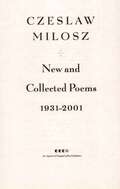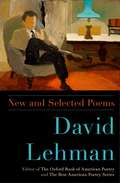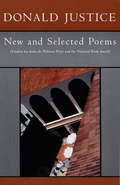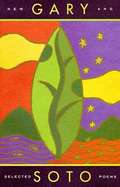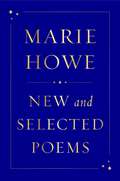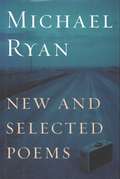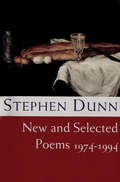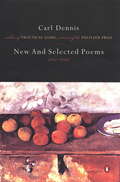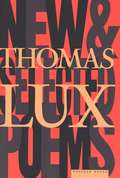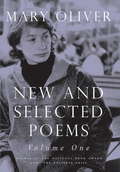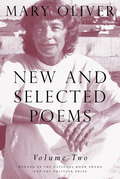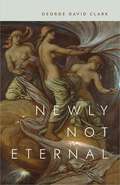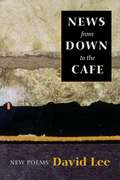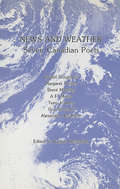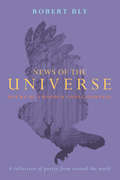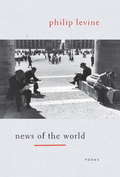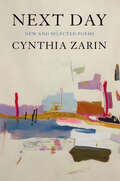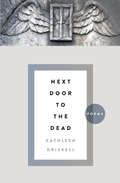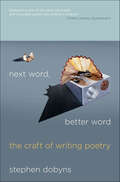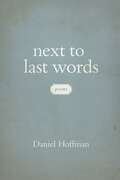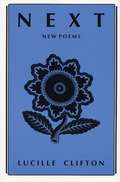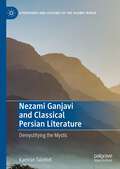- Table View
- List View
New and Collected Poems: 1931-2001
by Czeslaw MiloszNew and Collected Poems: 1931—2001 celebrates seven decades of Czeslaw Milosz’s exceptional career. Widely regarded as one of the greatest poets of our time, Milosz is a master of probing inquiry and graceful expression. His poetry is infused with a tireless spirit and penetrating insight into fundamental human dilemmas and the staggering yet simple truth that “to exist on the earth is beyond any power to name.” Czeslaw Milosz worked with the Polish Resistance movement in Warsaw during World War II and defected to France in 1951. His work brings to bear the political awareness of an exile—most notably in A Treatise on Poetry, a forty-page exploration of the world wars that rocked the first half of the twentieth century. His later poems also reflect the sharp political focus through which this Nobel Laureate never fails to bear witness to the events that stir the world. Digging among the rubble of the past, Milosz forges a vision that encompasses pain as well as joy. His work, wrote Edward Hirsch in the New York Times Book Review, is “one of the monumental splendors of poetry in our age.” With more than fifty poems from the end of Milosz’s career, this is an essential collection from one of the most important voices in contemporary poetry.
New and Selected Poems
by David LehmanA major collection of poems from one of our most accomplished poets, the prominent man of letters behind The Best American Poetry series.Drawing from a wealth of material produced over the course of more than forty years, David Lehman's New and Selected Poems displays the remarkable range of his poetic genius. From the beginning Lehman has combined the traditional with the experimental, intellect with passion, creating a singular body of work in a manner all his own. Beginning with a selection of compelling new poems that feature the poet's customary wit and ingenuity and add a layer of surprise and suspense, the book follows with carefully selected pieces from Lehman's seven full-length books of poetry since 1986: Yeshiva Boys (2009), When a Woman Loves a Man (2005), The Evening Sun (2002), The Daily Mirror: A Journal in Poetry (2000), Valentine Place (1996), Operation Memory (1990), and An Alternative to Speech (1986). A group of uncollected works, including hard-to find early poems from the late 1960s and 1970s, rounds out the volume. These are poems that captivate as they stimulate thought, poems that capture the romance, irony, and pathos of love, and poems that are lyrical and lovely in unexpected, sometimes even comic ways. A master of his craft, Lehman is as fluent in the prose poem as in the sonnet, the sestina, the villanelle, and verse forms of his own invention. He departs from autobiography not only in fictional forays but in poems that ponder the lives of World Historical Individuals (Napoleon, Wittgenstein, Freud), the persistence of ancient myths in modern life, the mysteries of love and desire, and his own heritage as the son of Holocaust refugees. Lehman's poems are dazzling in their evocation of the recent past. As Mary Jo Bang has written, "the whole of a world is here, and the remnants of an era--from Dinah Shore to Bob Dylan, from Hitler to Nixon." This is as inspiring and thought-provoking and beautiful a book as any David Lehman has written.
New and Selected Poems
by Donald Justice"He is one of our finest poets, " Anthony Hecht has said of Donald Justice. Winner most recently of a 1996 Lannan Literary Award, Justice has been the recipient of almost every contemporary grant and prize for poetry, from the Lamont to the Bollingen and the Pulitzer. The present volume replaces his 1980 Selected Poems and contains, in addition, poems from the last 15 years. <P><P> Pulitzer Prize Winner
New and Selected Poems
by Gary SotoFor over two decades, the award-winning poet and author Gary Soto has been offering his readers a vision that transcends the ordinary, making him one of today's most celebrated Chicano writers. New and Selected Poems includes the best of his seven full-length collections, plus over 23 new poems previously unpublished in book form. From the charged, short-lined poems of Soto's early writing to an unflinching look at poverty and hard labor in California's Central Valley to the off-beat humor in his longer, more recent work, New and Selected Poems is a timely tribute to a brilliant writer whose work confirms the power of the human spirit to survive and soar.
New and Selected Poems
by Marie HoweAn indispensable collection of more than four decades of profound, luminous poetry from acclaimed poet Marie Howe. Characterized by “a radical simplicity and seriousness of purpose, along with a fearless interest in autobiography and its tragedies and redemptions” (Matthew Zapruder, New York Times Magazine), Marie Howe’s poetry transforms penetrating observations of everyday life into sacred, humane miracles. This essential volume draws from each of Howe’s four previous collections—including What the Living Do (1997), a haunting archive of personal loss, and the National Book Award–longlisted Magdalene (2017), a spiritual and sensual exploration of contemporary womanhood—and contains twenty new poems. Whether speaking in the voice of the goddess Persephone or thinking about aging while walking the dog, Howe is “a light-bearer, an extraordinary poet of our human sorrow and ordinary joy” (Dorianne Laux).
New and Selected Poems
by Michael Ryan"Ryan is a scrupulously observant poet with a gift for going for the jugular . . . His work is finely honed, provocative, questing, and humane." - Edward Hirsch, Washington Post Book WorldMichael Ryan's first collection in fifteen years shows the acclaimed poet at the height of his powers. Highlighting the wit and passion displayed throughout his career, Ryan's latest work comprises fifty-seven poems from three award-winning volumes and thirty-one new poems. In both dramatic lyrics and complex narratives, Ryan renders the world with startling clarity, freshness, and intimacy. New and Selected Poems is filled with the stuff of everyday life, and as the New York Times Book Review said, it "include[s] pain and fear but also surprise, joy, laughter, everything human.""New and Selected Poems reminds us how much we have relied on this poet to forge a path for us in plain style." - Carol Muske-Dukes, Los Angeles Times Book Review"Ryan's poems have always felt as if they neded to be written. They seem to exist because of some pressure to respond, not because of a facility for language alone. This is a rare quality among poets. The commitment to it is as hard-won, and real, as any you are likely to find in poetry." - David Rivard, American Poetry ReviewMichael Ryan is the author of many acclaimed books, including three previous volumes of poetry. Among the honors for his work are the prestigious Kingsley Tufts Award, the Lenore Marshall Poetry Prize, a Whiting Writers' Award, and NEA and Guggenheim fellowships. Ryan is a professor of English and creative writing at the University of California at Irvine.
New and Selected Poems
by Thomas LuxIt's 1962, a year after the death of Sam's father--he was a war hero--and Sam and her mother must move, along with their very liberal views, to Jackson, Mississippi, her father's conservative hometown. Needless to say, they don't quite fit in. People like the McLemores fear that Sam, her mother, and her mother's artist friend, Perry, are in the South to "agitate" and to shake up the dividing lines between black and white and blur it all to grey. As racial injustices ensue--sit-ins and run-ins with secret white supremacists--Sam learns to focus with her camera lens to bring forth the social injustice out of the darkness and into the light.
New and Selected Poems 1974-1994
by Stephen DunnJustly celebrated as one of our strongest poets, Stephen Dunn selects from his eight collections and presents sixteen new poems marked by the haunting "Snowmass Cycle."
New and Selected Poems 1974-2004
by Carl DennisThe New York Times has called Carl Dennis's poetry "wise, original, and deeply moving. " A poet with a growing audience of admirers, Dennis writes in a clear, classically simple language that is both personal and universal. Making use of a rich variety of genres-advice, meditation, elegy, and prophecy-his poems take unexpected turns as they explore their subjects, catching the reader off balance in a way that is liberating. This new anthology gathers the best of his eight previous books along with a generous sampling of new poems.
New and Selected Poems 1974-2004
by Carl DennisThe New York Times has called Carl Dennis's poetry "wise, original, and deeply moving." A poet with a growing audience of admirers, Dennis writes in a clear, classically simple language that is both personal and universal. Making use of a rich variety of genres--advice, meditation, elegy, and prophecy--his poems take unexpected turns as they explore their subjects, catching the reader off balance in a way that is liberating. This new anthology gathers the best of his eight previous books along with a generous sampling of new poems.
New and Selected Poems of Thomas Lux: 1975-1995
by Thomas LuxOne of the New York Public Library's 25 "Books to Remember" in 1997 Lux comments on the absurd, the pathetic, and the commonplace in our culture, writing with compassion as well as satire. He is "singular among his peers in his ability to convey with a deceptive lightness the paradoxes of human emotion," says Publishers Weekly, and Robert Hass, in the Washington Post Book World, takes special note of Lux's "bitter wit, the kind of irony that comes with a quick, impatient intelligence."
New and Selected Poems, Volume One
by Mary OliverWhen New and Selected Poems, Volume One was originally published in 1992, Mary Oliver was awarded the National Book Award. In the fourteen years since its initial appearance it has become one of the best-selling volumes of poetry in the country. This collection features thirty poems published only in this volume as well as selections from the poet's first eight books.<P><P> Mary Oliver's perceptive, brilliantly crafted poems about the natural landscape and the fundamental questions of life and death have won high praise from critics and readers alike. "Do you love this world?" she interrupts a poem about peonies to ask the reader. "Do you cherish your humble and silky life?" She makes us see the extraordinary in our everyday lives, how something as common as light can be "an invitation/to happiness,/and that happiness,/when it's done right,/is a kind of holiness,/palpable and redemptive." She illuminates how a near miss with an alligator can be the catalyst for seeing the world "as if for the second time/the way it really is." Oliver's passionate demonstrations of delight are powerful reminders of the bond between every individual, all living things, and the natural world.<P> Winner of the National Book Award
New and Selected Poems, Volume Two
by Mary OliverMary Oliver has been writing poetry for nearly five decades, and in that time she has become America's foremost poetic voice on our experience of the physical world. This collection presents forty-two new poems-an entire volume in itself-along with works chosen by Oliver from six of the books she has published since New and Selected Poems, Volume One.
Newly Not Eternal
by George David ClarkEqual parts elegy and ode, Newly Not Eternal explores the startling suffering and sentiment implicit in human mortality. At the heart of this collection, a son has died on the cusp of his first breath, but the book’s stakes are larger and more universal than a single, silent, foreshortened life. Ranging from personal lyrics to monologues in persona, from triolets to a modified crown of sonnets, from surreal fantasy to natural landscape, George David Clark’s poems sing of the brutality of time and the beauty that transcends it.
News From Down to the Café: New Poems
by David LeeContents: Wayburne Pig, The Wayburne Team, Rhapsody for the Good Night: Christmas Eve, Sonora Portable Music Master (Made in the United States of America) 55 to 500 Kilocycles Table Model, Labor, Blow, Song E.U. Washburn Heard Sung to Tommy Malouf from the Cummings Plot, Sonata in Red, Burn, Righteous, The Relic, The Legend of the Monster in Two Draw, Song E.U. Washburn Heard the Mockingbird Sing Near the Grave of Janie Grace Gosset, Stranger, Private Conversation Overheard from the Booths: Eulogy After the Fact, or Reflections on a Gift from a Magus, The Fish, Land: Overheard Coffeecounter Conversation between Charlie Parks and Tommy Minor, A Hymn for Pearl, A Tale of Ignorance, Stupidity, and Cold Beer without Moderation, E.U. Washburn's Story: Uncle Abe, Housedogs, Classified, Conversation Overheard from a Back Booth on a Tuesday Afternoon After a Weekend Storm, The Twenty-One Gun Salute, Slow, Song E.U. Washburn Heard While Tending Roses over the Grave of Philemon and Baucis Rojas, Old, Epilogue Scribbled on Four Napkins and One Line on the Palm of a Hand While Sitting in a Back Booth with E.U. Washburn.
News and Weather: Seven Canadian Poets
by August KleinzahlerThis anthology cuts into the Canadian poetry scene on a fresh, oblique angle. Included are Robert Bringhurst, Margaret Avison, A.F. Moritz, Guy Birchard, Terry Humby, Alexander Hutchison and Brent MacKay.
News of the Universe: Poems of Twofold Consciousness (A\sierra Club Books Publication Ser.)
by Robert BlyAcclaimed poet and translator Robert Bly here assembles a unique cross-cultural anthology that illuminates the idea of a larger-than-human consciousness operating in the universe. The book's 150 poems come from around the world and many eras: from the ecstatic Sufi poet Rumi to contemporary voices like Kenneth Rexroth, Denise Levertov, Charles Simic, and Mary Oliver. Brilliant introductory essays trace our shifting attitudes toward the natural world, from the "old position" of dominating or denigrating nature, to the growing sympathy expressed by the Romantics and American poets like Whitman and Dickinson. Bly's translations of Neruda, Rilke, and others, along with superb examples of non-Western verse such as Eskimo and Zuni songs, complete this important, provocative anthology.
News of the World
by Philip LevineA superb new collection from “a great American poet . . . still at work on his almost-song of himself”(The New York Times Book Review). In both lively prose poems and more formal verse, Philip Levine brings us news from everywhere: from Detroit, where exhausted workers try to find a decent breakfast after the late shift, and Henry Ford, “supremely bored” in his mansion, clocks in at one of his plants . . . from Spain, where a woman sings a song that rises at dawn, like the dust of ages, through an open window . . . from Andorra, where an old Communist can now supply you with anything you want—a French radio, a Cadillac, or, if you have a week, an American film star. The world of his poetry is one of questionable magic: a typist lives for her only son who will die in a war to come; three boys fish in a river while a fine industrial residue falls on their shoulders. This is a haunted world in which exotic animals travel first class, an immigrant worker in Detroit yearns for the silence of his Siberian exile, and the Western mountains “maintain that huge silence we think of as divine. ” A rich, deeply felt collection from one of our master poets. From the Hardcover edition.
Next Day: New and Selected Poems
by Cynthia ZarinA selection of the dazzling work of one of the finest writers of her generation and winner of the Los Angeles Times Book Prize, a poet of elegant restraint, emotional depth, and moral visionBeginning with several dozen new poems that have appeared in The New Yorker, among other publications, this volume is a tour through Zarin&’s five exquisitely made collections, beginning with The Swordfish Tooth, published in 1989. Zarin, a poet in the line of Elizabeth Bishop, allows the reader to experience human truths through a poem's shape and music, bodied forth through intimate images—the turn in the stair, a snow globe, naked birch branches, a vase of flowers—and a propulsive syntax. From the clarity of childhood memory to the maze of marriage and divorce, from her own consciousness—shaping landscapes of New York, Cape Cod, and Rome, to the shifting tides of history and the troubled conscience of a nation, her subject matter encompasses all of a woman's life, with passion—its risks, satisfactions, and shattering immediacy—her first and truest subject.
Next Door to the Dead: Poems (Kentucky Voices)
by Kathleen Driskell“A collection of poems that are bold, inviting, charming, different, humorous, and irreverent. Often, they slip the bonds of common expectation.” —Northern Kentucky TribuneWhen Kathleen Driskell tells her husband that she’s gone to visit the neighbors, she means something different than most. The noted poet—whose last book, Seed Across Snow, was twice listed as a national bestseller by the Poetry Foundation—lives in an old country church just outside Louisville, Kentucky. Next door is an old graveyard that she was told had fallen out of use. In this marvelous new collection, this turns out not to be the case as the poet’s fascination with the “neighbors” brings the burial ground back to life.Driskell frequently strolls the cemetery grounds, imagining the lives and loves of those buried beside her property. These “neighbors,” with burial dates as early as 1848, inspire poems that weave stories, real and imagined, from the epitaphs and unmarked graves. Shifting between perspectives, she embraces and inhabits the voices of those laid to rest while also describing the grounds, the man who mows around the markers, and even the flocks of black birds that hover above before settling amongst the gravestones.Next Door to the Dead transcends time and place, linking the often disconnected worlds of the living and the deceased. Just as examining the tombstones forces the author to look more closely at her own life, Driskell’s poems and their muses compel us to examine our own mortality, as well as how we impact the finite lives of those around us.“Driskell has written her path to the Kentuckian sublime.” —Shane McCrae, author of Sometimes I Never Suffered
Next Word, Better Word: The Craft of Writing Poetry
by Stephen DobynsThis accessible writer's guide provides a helpful framework for creating poetry and navigates contemporary concerns and practices. Stephen Dobyns, author of the classic book on the beauty of poetry, Best Words, Best Order, moves into new terrain in this remarkable book. Bringing years of experience to bear on issues such as subject matter, the mechanics of poetry, and the revision process, Dobyns explores the complex relationship between writers and their work. From Philip Larkin to Pablo Neruda to William Butler Yeats, every chapter reveals useful lessons in these renowned poets' work. Both enlightening and encouraging, Next Word, Better Word demystifies a subtle art form and shows writers how to overcome obstacles in the creative process.
Next to Last Words: Poems
by Daniel HoffmanFor sixty years Daniel Hoffman has drawn on a lifetime of experiences to engage readers with his powerful imagination. The poems in Next to Last Words -- illuminated by the poet's unique vision and leavened by touches of humor -- continue this tradition. Equally skilled in formal and free verse, Hoffman explores our place in the cosmos, our kinship with nature, the violent world in which we must live, and the intense love and grief common to everyone's life.
Next: New Poems (American Poets Continuum #15.00)
by Lucille CliftonFinalist, 1988 Pulitzer Prize for Poetry. "Clifton mythologizes herself: that is, she illuminated her surroundings and history from within in a way that casts light on much beyond."--The Women's Review of Books
Nezami Ganjavi and Classical Persian Literature: Demystifying the Mystic (Literatures and Cultures of the Islamic World)
by Kamran TalattofThis book offers new insights into the twelfth-century Persian poet Nezami Ganjavi. Challenging the dominant interpretation of Nezami’s poetry as the product of mysticism or Islam, this book explores Nezami’s literary techniques such as his pictorial allegory and his profound conceptualization of poetry, rhetoric, and eloquence. It employs several theoretical and methodological approaches to clarify the nature of his artistic approach to poetry. Chapters explore Nezami’s understanding of rhetoric and literature as Sakhon, his interest in literary genres, the diversity of themes explored in his Five Treasures, the sources of Nezami’s creativity, and his literary devices. Exploring themes such as love, religion, science, wine, gender, and philosophy, this study compares Nezami’s works to other giants of Persian poetry such as Ferdowsi, Jami, Rudaki, and others. The book argues that Nezami’s main concern was to weave poetry rather than to promote any specific ideology.

